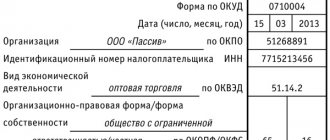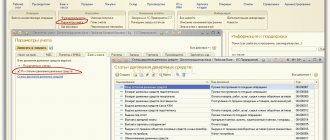What law governs cash transactions?
The procedure for conducting cash transactions has changed several times. At the time of writing, Bank of Russia Directive No. 3210-U dated March 11, 2014 is in effect. The directive approved a new procedure for conducting cash transactions with banknotes and coins of the Bank of Russia on the territory of the Russian Federation by legal entities (except for banks), as well as a simplified procedure for conducting cash transactions by individual entrepreneurs (IP) and small businesses. When conducting cash transactions, recipients of budget funds are guided by Directive No. 3210-U, unless otherwise specified by a regulatory legal act regulating the procedure for conducting cash transactions by recipients of budget funds. The document was registered with the Ministry of Justice of Russia on May 23, 2014 (No. 32404) and published in the “Bulletin of the Bank of Russia” No. 46 (1524) dated May 28, 2014. Directive No. 3210-U came into force on June 1, 2014, with the exception of the requirements for software and hardware for accepting Bank of Russia banknotes, which will be in effect from January 1, 2015. From the date of entry into force of Directive No. 3210-U, Bank of Russia Regulation No. 373-P dated October 12, 2011 “On the procedure for conducting cash transactions with banknotes and coins of the Bank of Russia on the territory of the Russian Federation” became invalid.
Maternity capital extended until 2021
The law on maternity capital was developed and approved back in 2006. Initially, it was assumed that this program would operate from January 1, 2007 until December 31, 2021. For ten years, families who decided to have more than one child could count on a large payment. Such support meant for them an easy solution to many problems related to living conditions, studies and simply a calm future.
In order for the amount of maternity capital to meet the needs of a family with a second child each year, indexation is carried out. This means that the original 250,000 rubles, which were maternity capital in 2007, are increasing taking into account modern prices and inflation. The exception was 2021, 2021, in which the amount of maternity capital remained equal to what it was in 2015.
In December 2017, the government of the Russian Federation nevertheless decided not to complete the program and extend it until December 31, 2021. Maternity capital has shown itself to be an undoubtedly useful and in many ways unique option for supporting family and fertility. It is impossible to say for sure whether maternity capital will be extended after 2021; all that is known is that the state considers it as a worthy goal, despite the amount of costs that the extension of maternity capital entails.
The amount of maternity capital in 2020
Despite the fact that the indexation of maternity capital was last carried out only in 2015, it will not be cancelled. The predicted changes in the amount of maternity capital for 2017 are an increase in maternity capital by 6 percent, for 2018 – by 5 percent. In fact, this means that 453,026 rubles in 2016 will grow into 492,348 rubles, and a year later into 505,000 rubles. However, changes in the amounts are still possible, so the answer to the question of what maternity capital is in 2021 may still change.
In fact, the forecasts did not come true and the amount of maternity capital in 2021 is 466.6 thousand rubles.
As a result, a family with a second child can count on a fair payment throughout the duration of maternity capital. The state’s decision to extend maternity capital until 2021 inclusive can help many more.
Restrictions on the operation of maternity capital
After the extension of maternity capital, many became interested in what would happen next. What will happen to this program after 2021, and what will happen to the maternity capital that has already been issued.
Here you need to take into account that there are three separate periods by which the validity of maternity capital is limited:
First of all, this is an opportunity to receive a certificate for maternity capital. It is valid only for those families in which a second child appeared (was born or was adopted). The opportunity is valid until the last day of 2018 inclusive;
The second is the opportunity to obtain a certificate. If the second child was born before the above period, then you can apply for a certificate for maternity capital at any time, there are no restrictions;
And thirdly, this is the period before which you can receive payment under the certificate. And there are no restrictions here either; the family can spend capital when it is beneficial for itself.
Found an error? Select it and press Ctrl + Enter. Bankiros.ru team 34,910 Tell your friends: Subscribe to Bankiros.ru
How much money can be issued for reporting?
The maximum amount of accountable money is not limited by law. Also, the legislation does not establish a maximum period for which accountable funds are issued. But you need to understand that, according to the Directive of the Bank of Russia dated 07.10.2013 N 3073-U, cash payments in the Russian Federation between legal entities, as well as between a legal entity and an individual entrepreneur, between individual entrepreneurs related to their business activities, within one agreements concluded between these persons may be made in an amount not exceeding 100 thousand rubles. Therefore, if funds are issued for settlement under a contract, then it is logical not to exceed the limit of 100 thousand rubles.
Payments made by notaries through accountants
Let's consider the situation. The employer-notary plans to issue cash on account to the employee for the purchase of a computer worth more than 110,000 rubles. Does he have the right to do this and can the seller refuse to accept the full amount in cash to the notary office employee?
In this case, there will be no restrictions on the amount of amounts - neither on the amount reported (since there are no such restrictions in principle), nor on the amount paid. The fact is that notarial activity is recognized as a legal activity performed on behalf of the state and is not recognized as entrepreneurial, since it is not accompanied by the extraction of profit (Resolution of the Constitutional Court of the Russian Federation dated May 19, 1998 No. 15-P).
At the same time, privately practicing notaries are equated to entrepreneurs only in tax legal relations (Article 11 of the Tax Code of the Russian Federation). In other cases (including those related to cash payments), notaries are not subject to the rules established for individual entrepreneurs (letter of the Federal Tax Service for Moscow dated 04/08/2011 No. 17-26/034104). Therefore, an employee of a notary office who has received cash on account from his employer can pay in full with it, even if the purchase price is more than 100,000 rubles.
Is it possible to transfer accountable amounts to an employee’s salary card?
Can. The Russian Ministry of Finance recommends using this method of settlements with accountable persons (letter of the Ministry of Finance dated October 5, 2012 No. 14-03-03/728). Transferring funds to employees' accounts opened with credit institutions for settlements using payment (debit) cards is comfortable and simplifies the procedures for the employer to fulfill its obligations to reimburse travel expenses made by the employee, and also increases the efficiency and reliability of payments. But so that the tax authorities do not regard the amounts transferred to the employee’s card as wages, when transferring funds, indicate in the purpose of the payment “for travel expenses” or “for business needs.”
What is maternity capital
Initially, the program was created to provide state support to Russian families in which a second child was born/adopted during the specified period. Payment can also be made upon the birth/adoption of a third child and subsequent children, however, this is carried out only if the condition is met that maternity capital has not been issued previously. Thus, Maternity Capital is not issued in the event of the birth/adoption of the first child, and it can be issued once per family.
Maternity capital is not allocated to a specific child, it is provided for the right to use by the whole family. An important point is the fact that cashing out any amount of maternity capital is prohibited. The funds are stored in the account of the Russian Pension Fund. Money can be transferred after the child’s third birthday, after which the account was opened. If you need to use maternity capital, you can pay for the following purposes:
- Obtaining or improving housing. One of the most important problems - housing - often simply does not allow a family to have a child, since there will be nowhere to raise him. Maternity capital makes it possible to reconstruct a private house or exchange an old apartment for a new one. In the latter case, the difference in apartment prices will be covered by maternity capital funds. In addition, maternity capital can be used to fully pay off the mortgage. If the amount of debt turns out to be greater than the capital, you can reduce the size of the monthly payment or reduce the time of payments, thus bringing closer the day of complete debt relief;
- Studies. Another very important point that occupies the minds of almost all parents. Studying for a child, especially at a higher institution, can be very expensive, so maternal capital will come in very handy. An additional advantage is that, in addition to the study itself, maternity capital can also be used to pay for a dormitory if the higher education institution is located in another city;
- A one-time payment for a family that urgently needs money for any everyday needs. This option was withdrawn some time ago, but is planned to be reintroduced;
- You can use all the money from maternity capital to pay for your mother’s pension. This will allow you to create a savings portion and receive interest upon retirement. If necessary, maternity capital can be withdrawn and used for another business;
- Another option that has appeared quite recently is the use of maternal capital for the needs of a disabled child. In this case, maternity capital will reimburse all the money that the family spends on purchasing goods and paying for services for a disabled child.
Parents are issued a specific certificate, for which they must contact the Pension Fund office at their place of residence.
Maternity capital is overwhelmingly spent on apartments, since purchasing a home is the highest priority for families.
The determining condition for using maternity capital funds is the prohibition of spending funds on paying off bank debts, as well as on a car. Maternity capital is not subject to taxes, but it also cannot be kept on deposit and in any way converted into cash. Any transactions involving maternity capital are carried out exclusively by bank transfer. Cashing out any amount is illegal and entails criminal liability for misuse of public funds.
How to correctly report the accountable amount
The accountable person is obliged, within a period not exceeding three working days after the expiration date for which cash was issued on account, or from the date of return to work, to present to the chief accountant or accountant, and in their absence, to the manager, an advance report with attached supporting documents. Checking the advance report by the chief accountant or accountant, and in their absence - by the manager, its approval by the manager and the final settlement of the advance report are carried out within the period established by the manager.
Electronic expense reports and electronic checks
One of the noticeable results of the active development of technology has been the emergence of electronic documents in the activities of companies. Electronic documents also include documents generated on paper, but using modern technology connected to online cash registers.
If you pay attention to electronic receipts, an important element in them is the QR code. In light of recent changes in legislation, even the fact that the seller shows the QR code on his monitor to the employee, and he reads it using a smartphone, will be considered the issuance of an electronic check.
Several years ago, Letter No. 03-03-07/12250 of the Ministry of Finance of the Russian Federation dated April 12, 2013 was issued, which stipulates that advance payment can be submitted in electronic form. How this is done in practice:
- If the company has implemented EDI
When implementing EDI, a special program is installed on employees’ PCs or laptops. Each employee has his own electronic signature (ES), which allows this program to generate an advance report in the prescribed form, sign it with an ES and attach to it the necessary electronic documents and electronic checks that he received from suppliers.
The accountant receives an electronic expense report, already signed with the personal signatures of the employee and the financial manager (director or financial director). If everything is in order with the document, then he signs it with his electronic signature.
If the tax office, as part of an on-site documentary verification, requests documents confirming cash discipline, it can be provided with electronic advance reports with attached electronic cash receipts.
- If the company does not have EDI
If there is no EDI, then the company has the right to keep records in paper form. In this case, the employee will have to fill out the advance report form established by the Central Bank and attach paper cash receipts confirming expenses to it.
Today, all checks that contain a QR code, as well as strict reporting forms (SSR), must be stamped by suppliers and sellers on cash registers connected to online cash registers.
From July 1, 2021, BSOs are accepted for accounting as expenses only in the most extreme cases - when, in accordance with the law, a given supplier has the right to sell its goods or services without a cash register. In all other cases, all checks presented by accountants must have a QR code.
The law does not yet require verification of these checks. But today all economically feasible expenses must be supported by documents. To check all receipts presented as part of advance reports, install the Federal Tax Service application “Checking Cash Receipts”.
What is the responsibility for issuing an accountable amount to an employee who has a debt?
Tax inspectors use two options:
- There is a practice of recognizing the accountable amount received and not returned as income. Tax inspectors assess personal income tax and insurance premiums. There are court decisions supporting tax authorities: resolutions of the Federal Antimonopoly Service of the North-West District dated 06/04/2007. No. Ф04-3478/2007(34785-А46-43), FAS ZSO dated November 14, 2005. No. Ф04-8038/2005(16759-А27-25). More recent judicial practice says that the money issued was and remains accountable; ownership of it has not transferred. Cash does not become an employee’s income as long as there is a possibility of returning it to the cash desk on a voluntary basis (resolution of the Federal Antimonopoly Service of the Eastern Military District dated November 12, 2008 No. A43-3598/2008-6-65, Federal Antimonopoly Service of the North-West District dated November 7, 2008 No. A66-4549/2007 , FAS UO dated February 20, 2008 No. Ф09-516/08-С2, FAS North Caucasus Region dated December 11, 2006 No. Ф08-5708/2006-2386А).
- Most often, tax inspectors document a violation of the procedure for conducting cash transactions. Liability is provided under Article 15.1 of the Administrative Code in the amount of 4000-5000 rubles. for officials, 40,000-50,000 rubles. for legal entities.
More on the topic: Changes in the procedure for conducting cash transactions from June 1, 2014
Firm maker Accounting services for LLC, December 2014 Anna Sheshenina (Luksha) When using the material, reference is required
Who has the right to receive money
Each employer, according to Part 1 of Art. 19 Federal Law dated December 6, 2011 No. 402-FZ “On Accounting”, is obliged to organize and maintain internal control of the facts of economic activity. The procedure for monitoring the issuance of money to accountable persons must be determined by the head of the company. He may issue an order with a list of persons entitled to receive funds from the organization’s cash desk.
Accountable persons are persons to whom an organization or individual entrepreneur gives money to carry out instructions and who are obliged to provide a report on their use. Accountable persons can be any employees of the enterprise
More responsibilities for a cashier
Amendments are made to paragraph. 4 pp. 4.6 The procedure for conducting cash transactions and concerns changes in the procedure for reconciling the data contained in the cash book.
Previously, at the end of the working day, the cashier was required to verify the data contained in the cash book with the data of cash documents. He was also obliged to display the amount of cash balance in the cash book and sign it. Now the cash book data is verified not only with the data of incoming and outgoing orders, but also with the actual amount of cash in the cash register.
For what period can money be issued for reporting 2021
Therefore, it is usually indicated in the employer’s order. According to clause 6.3 of the Directive of the Central Bank of the Russian Federation dated March 11, 2014 No. 3210-U, the employee is obliged to provide a report on the amounts received no later than three working days after the expiration of the period for which these amounts were issued.
If the return period has not been established, the employee must submit the report on the same day on which he received them.
U and are as follows: Money is issued to an accountable employee only for the purpose of meeting expenses related to the business activities of the company (or individual entrepreneur).
The basis for issuance is an employee’s statement containing an indication of the amount of the requested amount, as well as the period for which it is taken, the date and visa of the manager, or (from 08/19/2019 according to the Bank of Russia’s instructions dated 06/19/2019 No. 4416-U) an order from the head of the legal entity (or individual entrepreneur).
In this article we will talk about the maximum order amount from Aliexpress to Russia without duty.
Aliexpress is a very popular site, but not everyone knows that there are certain restrictions regarding the amount and weight of parcels transported through customs. Customs restrictions on the import of goods from China to Russia apply not only to Aliexpress, but also to other Internet sites. Let's look at what rules apply.
If you do not yet have experience purchasing goods on this site, we recommend that you study the article “How to make your first purchase on Aliexpress?”
Results
The maximum amount for reporting to an employee is not established by regulatory documents. However, it should be distinguished from the amount paid by the accountable when making settlements with the supplier of goods and services.
It is not easy to hold a company or entrepreneur accountable for issuing funds on account in cases that can be interpreted in a different economic way.
However, we recommend that you undertake any accountable transactions with extreme caution and take into account possible risks. You can find more complete information on the topic in ConsultantPlus. Free trial access to the system for 2 days.
Accounting and the amount of settlement with the supplier are not the same thing
When there is a conversation about limiting the amounts involved in accountable business operations, confusion often arises and the amount of 100,000 rubles is mentioned. Where did she come from?
It should be understood that the process of receiving and spending funds by an accountable employee includes 2 main business operations:
- Receiving money from the employer as an account for purchases necessary for the implementation of its activities.
- Purchasing goods and services from a supplier and making payments to him.
And if the first operation, as we found out, does not imply legislative restrictions on amounts, then the second in terms of cash payments (i.e., money issued on account) is strictly regulated by the Bank of Russia directive “On making cash payments” dated October 7, 2013 No. 3073 -U, setting a limit amount for them. According to clause 6 of this document, the limit is in the amount of 100,000 rubles. applies to cash payments under one agreement made between legal entities, entrepreneurs, as well as between a legal entity and an individual entrepreneur.
IMPORTANT! The above restriction does not apply to ordinary individuals (citizens who are not entrepreneurs) participating in settlements with companies and individual entrepreneurs. At the same time, an individual employee who acts in a transaction not independently, but on behalf of his employer (for example, by proxy), is also obliged to comply with cash payments (Article 182 of the Civil Code of the Russian Federation).
NOTE! Regarding the establishment of the maximum possible amount of 100,000 rubles. The legislation does not provide for any time limits (for example, the common misconception “100,000 rubles in one day”). Thus, this limit cannot be circumvented by dividing the payment amount under the agreement into several payment transactions made on different days.









